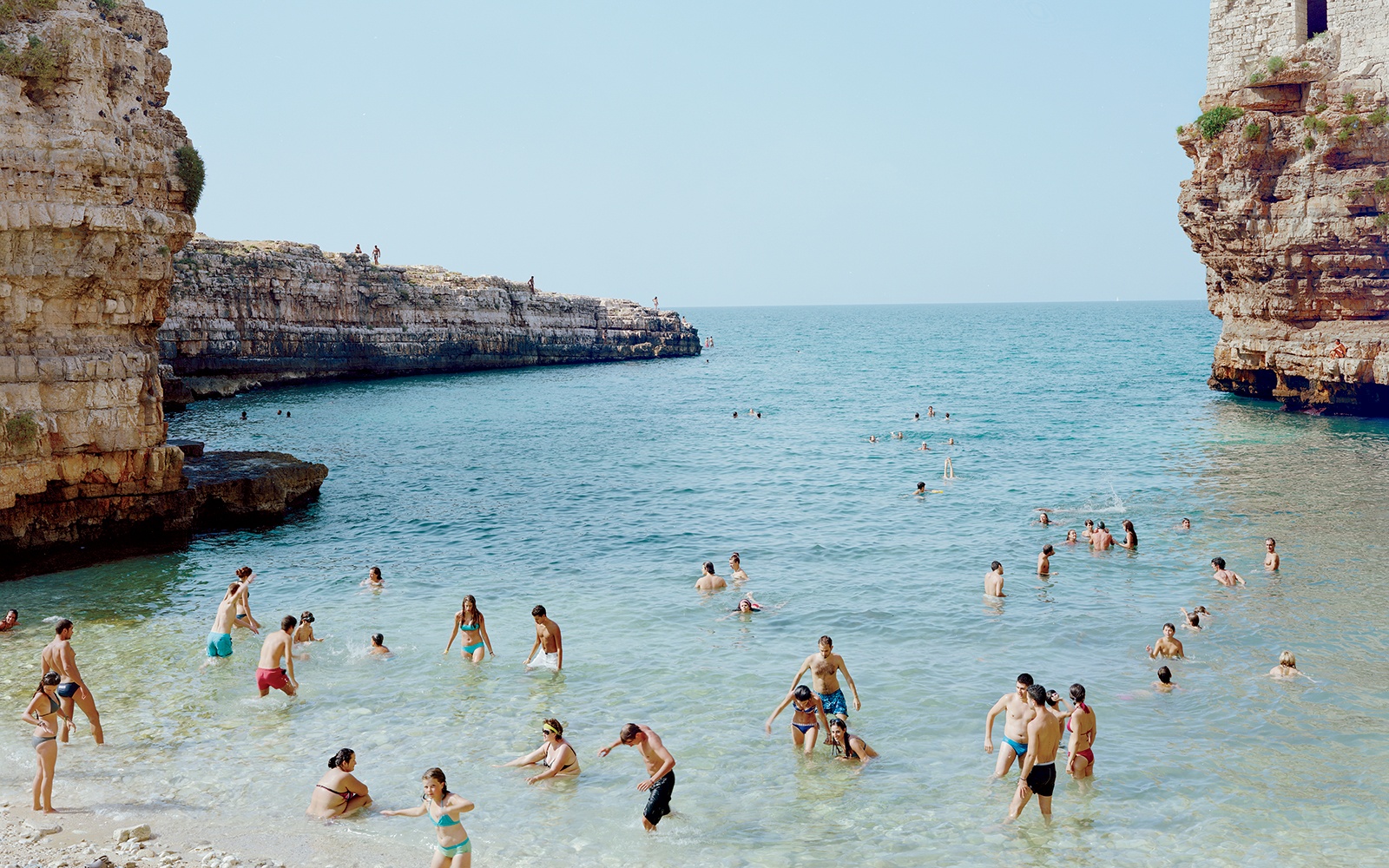
In-the-know travelers have been buzzing about Puglia's arrival as the next big Mediterranean hot spot, but that's news to Puglia. Devin Friedman goes to the sun-swept region in southern Italy and discovers an enduringly unbuttoned and decidedly local summer refuge.
Someone told me that if I went to Puglia I should go to Ennio Capasa’s beach club. This was a person who knows figures like Ennio Capasa, the creative director and proprietor of the fashion label Costume National. I said sure, if you can set that up I would be happy to go to the beach club of the Costume National guy; it would surely be better than whatever else I’d be doing. Which is how I ended up sitting at Ennio Capasa’s beach club, La Castellana, discussing his passionate theory about why Puglia is the last great unspoiled summer place in Italy.
By that point, afternoon had begun to take hold. Out on the water it was still bright as midday, but on the beach shadow was now overtaking us. There was a small restaurant with a tiny outdoor kitchen at the far end of La Castellana, and tables set up on a small lawn. The cook, a woman in a striped apron, was throwing small fish called triglie onto the grill. When they came out on plates they had browned and curled like burned paper. For the children there was meatball lasagna, and parents were trying to coax a group of boys who were playing beach soccer into having something to eat. Ennio ordered for us and began to lay out his aesthetic philosophy of Puglia. That it turned out to be ardent and intense should surprise no one: both fashion designers and Italians tend to be deadly serious about their aesthetic philosophies. He began with a Socratic question: So what do you think of this place?
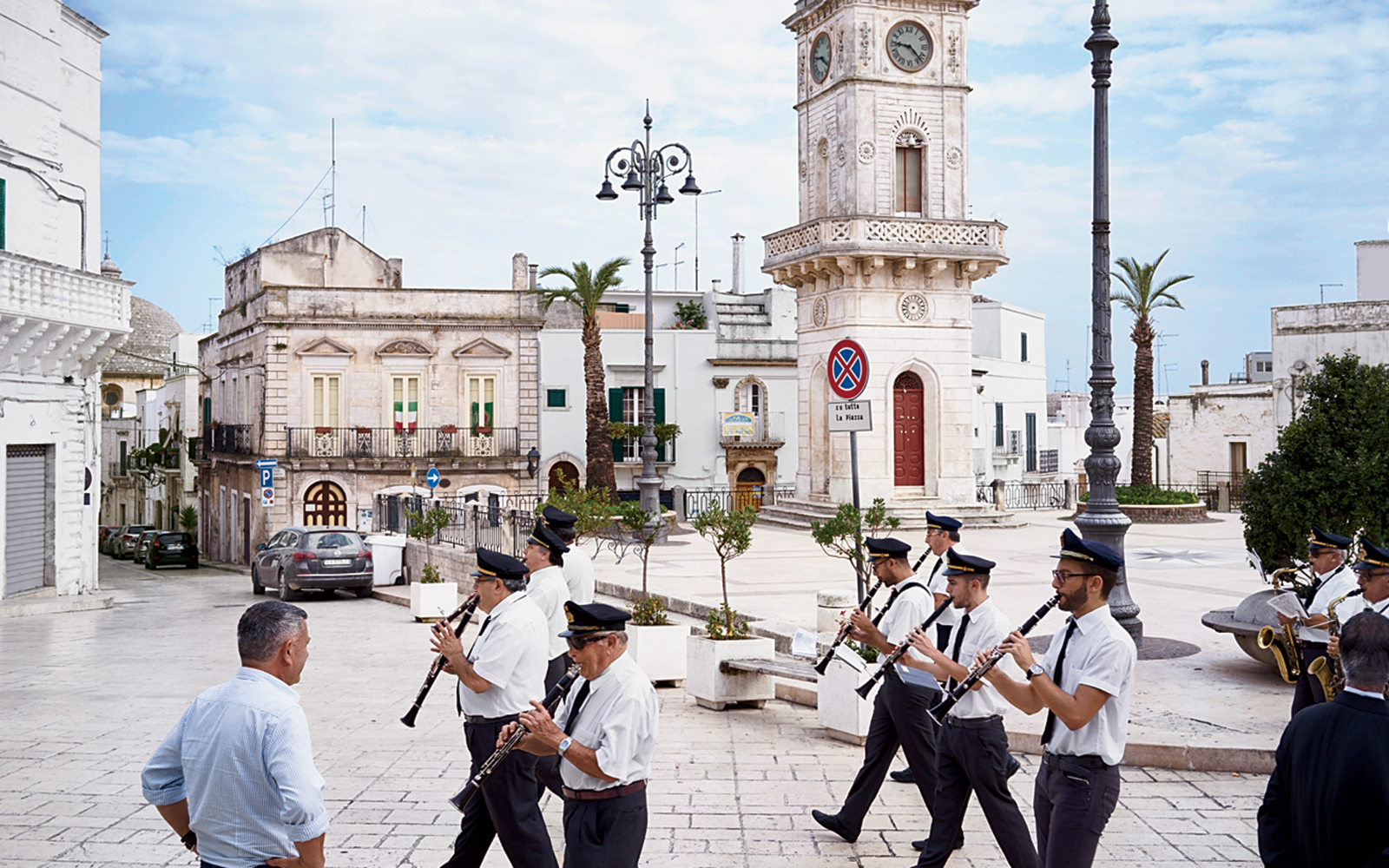 Massimo Vitali
Massimo Vitali
My wife and two kids and I had come to Puglia to stay with our friends David and Francesco, up the coast, and we'd driven down that morning to meet Ennio. Where should we meet you, I’d asked when I called him to make plans. Oh just meet me in town, Ennio said, meaning Otranto.
Otranto was teeming. It’s on the heel of the boot, the Italian extremity, the easternmost town in Italy, a fortified village built onto promontory rocks, and beneath it is the gorgeous Korean Airlines blue of the Adriatic. You can theoretically see Albania across the sea from here. Its beauty is not precious and painfully reconstructed like the beautiful Renaissance towns of Tuscany. There are low-slung slabs of concrete near the famous, centuries-old historic cathedral. (I don’t normally go in for centuries-old historic cathedrals, but this one features some insane Romanesque mosaic tile work possessed of a distinctly pre-Christian flavor and features what look like donkey mermaids in flagrante delicto.)
Ennio had found us pulled over on a road in town and leaped from his car with an irrepressible energy. “Welcome, welcome!” he said. Ennio: thick black hair, a virile beard, a handsome face with laugh lines tanned in. He wore only a pair of flimsy navy swim trunks and a denim shirt open to the waist and also beyond the waist. He was, as he would remain, barefoot. Not just technically barefoot but philosophically barefoot. You know, the salt-sprayed hair, the way he unselfconsciously scratched his ass, the tanned chest—it all spoke not of visiting the beach carrying a tote bag filled with sunscreen and sweaty cheese sandwiches, but of rolling out of bed and down to the beach and then back up to a table for some bracing white wine and olives and cheese and fresh fruit every day for the whole summer. I felt instantly jealous of his life and worried I would never belong to a place the way he does. He had us follow him in his car.
More about La Castellana. It’s like one minute you’re cramming your little Opel or Renault into a bathtub-size parking space right in the middle of Otranto’s hectic center where people are beeping horns and haggling over the cost of fish heads for their soup, and the next minute you’ve emerged from a little rocky track onto this wedge of beach that’s hidden in plain sight. A 100-yard-wide spit of sand that spills into the sea not far from the little fishing port. Puglia isn’t this endless spread of verdant green with wide sandy beaches. It’s economical with all indulgences save for sunlight and olive trees. Every few kilometers, the Adriatic allows for a cove, a break in the rocky coastline, and that is your beach.
When I arrived, I saw in the foreground a collection of white beach chairs with white beach umbrellas beneath which Italian men read salmon-colored newspapers through scrims of their own fragrant cigarillo smoke. Beyond were tranquil aquamarine shallows where beautiful Italian moms stood in sarongs smoking cigarettes and talking to each other while at their knees swam beautiful children. Everywhere was the soft sheen of lives lived mostly sheltered from hardship. Do you ever feel like people are having amazing vacations in little places you can never find? Well, in Otranto they’re at La Castellana. Italians who’ve been coming here for generations. Kids who grew up here and now take their kids here.
The shadows were now drawing longer and Ennio fastened a button on his shirt as he waited for my answer.
“Yes,” I said to him. “Of course I like it here. It’s the best place in the world.”
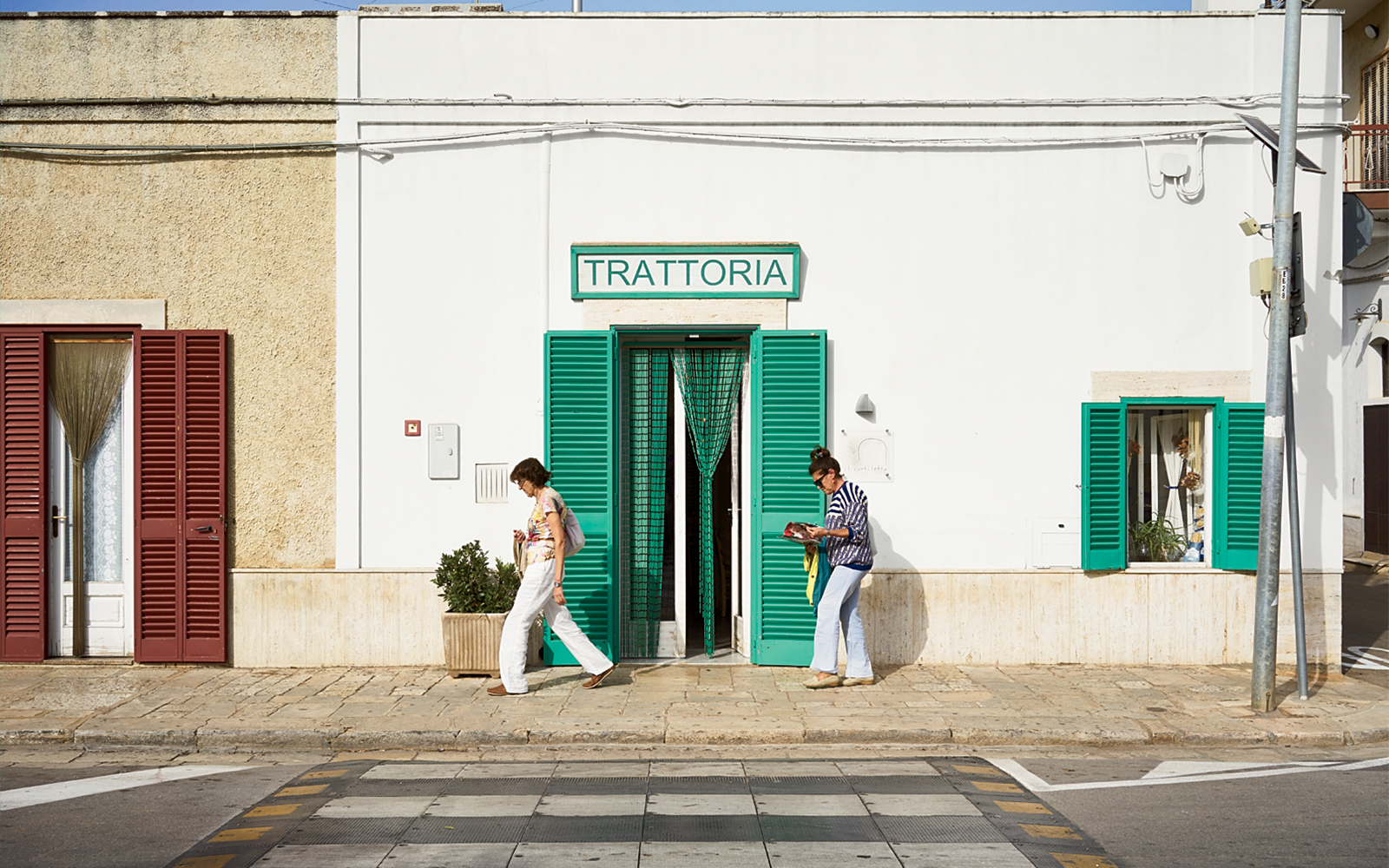 Massimo Vitali
Massimo Vitali
Ennio agreed. He was expansive when it came to why Puglia was the best place on earth. It was the quality of the red, Martian-y soil, he said. The low humidity. The dry rocky terrain and the dry crusty bread. The waters between here and Albania, he said, were so narrow that all manner of aquatic life was forced through a bottleneck—you could catch even the most delicious and unusual fish here. There was another theory advanced about seaweed. The cactuses, the old Roman fortresses, the skies so high it’s like someone popped the hatch on the planet. Willem Dafoe, Ennio said, felt the magic here, sensed the same drop in blood pressure when he arrived that we all do. He got married at Ennio’s house. Mick Jagger visited a couple of years ago. Both understood that they were in that rarest of places. Puglia, Ennio said, his voice acquiring that richness, that emotional quaver that nearly every Italian person acquires while talking about where they live even if they hate where they live and later beg you to take them back to New York—Puglia, he said, was still a real place. One of the last real beautiful real places in Italy.
“It is simple here. It is relaxed. It is private. The tourism here is local tourism. Everyone knows each other, their families have been coming for generations. The Costa Smeralda, in Sardinia, is beautiful, but it’s fake. Portofino is fake, it’s not a real village. But Puglia.... Even this place,” he said, speaking about La Castellana, “is a real place, authentic.”
He was right. There was a quality of realness to the fantasy here. It’s true that it’s one of the outposts of an ever-expanding international coolification project. For Puglia it began a little more than a decade ago, when the English discovered that it’s warm and dry and beautiful and less expensive than it should be, that none of the various forms of Italian mafia will shake you down or shoot you in the face. So a few hardy souls rented some houses. Others bought them and built infinity pools. Those houses and vistas began to appear on Instagram and ownersdirect.uk and eventually Airbnb. Hotels were built. People set up restaurants to serve farm-to-table meals. Cheap European airlines opened routes from London and Munich and Milan. It got, in short, the Todos Santos/Montauk/Tulum treatment. But Puglia is resilient. It’s still not precious or ostentatious and, for better or worse, probably never will be. That’s the point, right? Ennio was saying we’re here because it very specifically isn’t Capri. It’s the Brooklyn to Portofino’s West Village. It’s the Los Feliz to Siena’s Bel Air.
The south of Puglia is called Salento. It’s a bit wilder down there. Otranto is in Salento. If you fly in to Brindisi, you’ll be flying in to the heart of Salento. You will also be flying with waves of summertime refugees from the U.K.—Brindisi is their Ellis Island—who’ve come to flaunt their annoyingly valuable currency and sun their pink faces and wear their pastel golf shirts. North of Salento is the Valle d’Itria. You’re going to want to drive around here and take pictures of the little conical stone houses called trulli. Some people think the trullo looks like something a hobbit would live in; others find it reminiscent of one of those silver domes that waiters yank off a fancy dish when it is served. Many people like to rent them for their summer holiday: beneath those domes, it is said, you sleep as if you were back in your mother’s uterus, though maybe it sounds better in Italian. The Valle d’Itria is where you’ll find the charms of Puglia in their most concentrated form. The beaches, the charming restaurants in the charming towns—towns with names like Ostuni and Ceglie Messapica and Cisternino and Locorotondo. It also has the best hotels.
Sadly, while the “real”-ness Ennio mentioned may be appealing, you will never be one of the Italians who have been coming to Puglia since you were a kid because your parents were coming here since they were kids and your grandfather owned a farm worked by local peasants. But there is a second-best thing: Borgo Egnazia. You might think that the owners of Borgo Egnazia—an amiable businessman named Aldo Melpignano and his family—painstakingly reconstructed an old village to make their hotel. But you would be wrong. The Borgo rose out of Adriatic rock all at once, like a Fortress of Solitude made of Pugliese tufo stone and pocked with swimming pools. It is not a pretend village in the chilling way the Disney-built town of Celebration, Florida, is. This is the place where Justin Timberlake got married. The density is low, the vicoli are quiet, tasteful conversation comes to you from across the courtyard like birdsong. It is the first and only true high-end Pugliese resort of the type found in places like Dubai and Turks and Caicos—a whole city of leisure.
At the Borgo Egnazia resort there is always one man to move your umbrella and another to bring fresh towels. They are twins, born to an Amazonian mother and Lorenzo Lamas, birthed into a slather of tanning oil and raised on the ancient arts of CrossFit and growing perfect beard stubble. At the Borgo Egnazia there is always a bar or a pool tucked around the corner just when you’re thinking gosh I wish there was a pool or a bar right here. (There are also lots of tanned European aristocrats eating breakfast in $600 white shirts, which I found a little intimidating.) You’re given bikes to ride around on because there are no cars. There is even a central piazza, which looks like an actual Pugliese piazza, in which they are always holding outdoor film screenings and children’s pizza parties. There are two beach clubs and a golf course, and you can be delivered to both by golf cart.
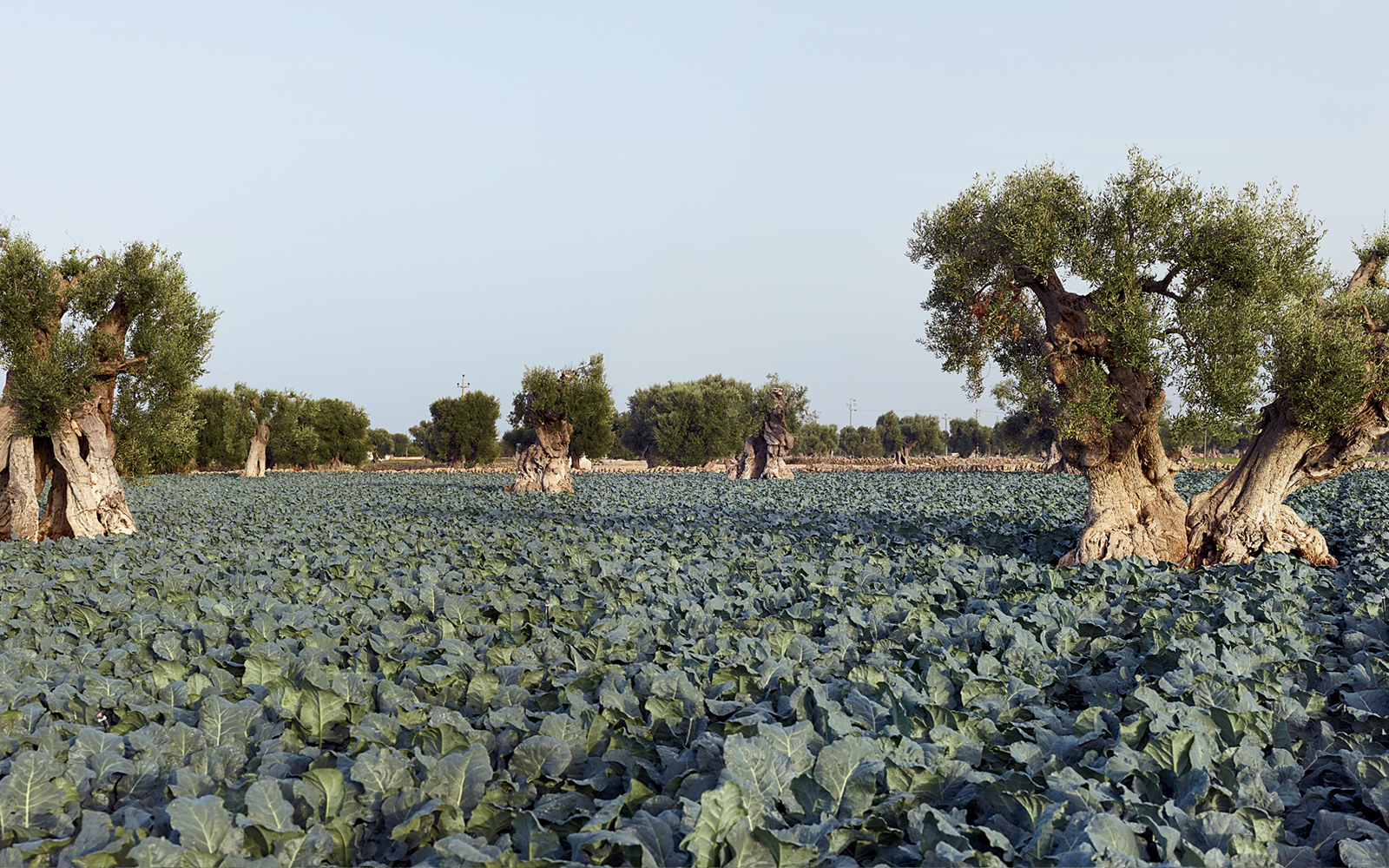 Massimo Vitali
Massimo Vitali
In order to feel better about spending all your time next to a pool, slowly baking like a piece of human terra-cotta, you’ll probably want to take in some of the local attractions. My favorites could be classified in two categories: 1) eating your face off, and 2) swimming. Here is what I humbly present as the best of both.
1. Go to Cisternino, which is a charming little hilltop town with perhaps the sweetest little central piazza in all of Puglia. Eat dinner at Da Zio Pietro, a butcher and restaurant with a strange system native to the area: you pick out your meat at a butcher counter, then they cook it over an open wood fire, then you sit outdoors and eat it and drink cheap red wine. The tables are clustered under the old stone overpasses on narrow streets that echo with the voices of people happily gorging on meat by candlelight. Get the bombette (little meatballs made of pork or beef, served spicy or savory), the lamb sausage, the little roasted potatoes covered in olive oil and salt and whatever else your animal-murderous little heart desires.
2. Look at really old (like 3,000 years old, supposedly) gnarled olive trees that seem like they could reach out and grab Dorothy (and her little dog, too!) at any moment. But don’t take the tour at Masseria Brancati, because hearing about how olive oil production changed over the last 800 years will probably bore your eyeballs straight out of your head.
3. After dinner at Da Zio Pietro, get gelato at Bar Fod, a few hundred feet away in the little jewel-box piazza in the center of Cisternino, where stores selling perfect shorts and frocks for Italian beach vacations stay open late into the night. Bar Fod still makes its gelato by hand, from local almonds and fruit.
4. Spend a night in Ceglie Messapica, my second favorite town after Cisternino. Both are located on the spine of the hills that rise from the coastal plain and provide a “belvedere”—a little municipal park right on a cliff from which to watch the light die over Puglia at day’s end. Eat at Cibus, where they make their own bread and pasta and age their cheese in their cellar. Be sure to get one of the tables nestled alfresco in an alley, and order the ice cream made from local figs that have been soaked in liqueur for three years.
5. If Borgo Egnazia isn’t your speed, stay at Masseria Torre Coccaro—a smaller, more homey place with a bit more scruff but still beautiful. While Borgo is like living in a semi-authentic Pugliese town designed for maximum pleasure, Torre Coccaro is more like a family compound. Camp out at one of the 33 little rooms clustered around the ivy-covered masseria (a fortified stone building, half farmhouse, half castle), and spend your days at their beach club or at their beautiful curvy swimming pool with a sand deck, where you can observe the vacation practices of beautiful Italian families (Torre Coccaro has, anecdotally, more Italians per square inch than Borgo). At the pool restaurant, salty paillards of chicken and grilled squid await when you’re ready for lunch. And the whole place is presided over by Vittorio Muolo, who will sit with you and have a leisurely glass of wine in the afternoon to make sure you’re feeling at home.
6. Near both Borgo and Torre Coccaro is the little seaside town of Savelletri. Eat raw seafood right on the water at Pescheria Due Mari, a slick little glass cube plopped right in this fishing village frequented, of course, by the families that own Borgo and Torre Coccaro. Have a glass of Verdeca, the local white varietal, and eat some raw gambero rosso shrimp and tonno and dentice. Or buy a plate of raw sea urchins to take home with you from Da Pino e Vincenzo, a tiny seafood supplier that deals only in sea urchins. It’s worth it just to stop in and watch the old women cutting them open with scissors and rinsing them in seawater.
7. Head inland from Savelletri to the one-main-street village of Speziale. On that one main street is Crovace, a little deli where they make mozzarella and burrata and fresh ricotta daily (these fresh-milk cheeses are called latticini) and, a bit farther on, a little trattoria called Il Cortiletto. You can eat out back in the bright, whitewashed little yard and enjoy rather more sophisticated Pugliese dishes—like gnocchi with walnut and pomegranate—than you’d imagine.
8. You’re going to want to go to the beach. Viar Beach Club, near Ostuni, is the best if what you’re looking for is a supremely local vibe. Not nearly as precious and high-end as Ennio Capasa’s (or Borgo or Torre Coccaro), but appealing because of that. A great place for your kids to meet and play with little Italian kids. Expect a slight kitsch factor.
9. Italians like to eat doughnutty things the size of their heads for breakfast, which I don’t really understand. But my advice is, don’t be haughty and complain about the lack of house-made granola; just get up early and head over to the town of Torre Canne and run into the open arms of insulin shock. There, on the main drag, is a bakery called L’Angolo del Cornetto where at 8 a.m. you will find a line of people already forming—women in house shoes and men in hair gel—for fresh-baked cornetti that are warm and soft and heavy with yellow custard. They’re very southern Italian—someone from Rome or Milan would probably run screaming from them; a French person would rather microwave his lapdog than put one in his mouth. Sit on the curb like we did, unwrap your cornetti, and people-watch: A beach ball of a man blowing up an actual beach ball. A man so long and thin he seems like a broomstick with a mustache comparing one Chinese-made snorkel with another at the Gazzetta di Mezzogiorno, the chain of newspaper and plastic-beach-toy emporiums you find throughout the region (Mezzogiorno is the name for southern Italy). Like Ennio says, the tourism is local.
Get all that stuff out of the way. Because if you’re not doing nothing, you’re not really experiencing Puglia. It is how one communes with the salient feature here: the onslaught of days that are always the same, always perfect. Weather designed for spending as many hours as fill up a week sitting around the pool falling asleep, almost spilling your glass of rosé before rousing and taking a dunk in the pool and then settling into your chair again. A rocky, North Africanish terrain with skies so perfectly clear that, after a day or two, if the tiniest cumulus crosses the sun, or even a little sliver of an airplane appears at 30,000 feet, you think, oh great, you just ruined my whole day. When you get bored, you can shower and get ready for dinner.
And that is what we did. We rented a trullo near Ostuni from Francesco and David, our friends of friends who live next door. It was a small stone house, like a small dry cave. You had to stoop to get into the bedroom. The floor was cold even when it was a hundred degrees outside, as if an icy subterranean river ran beneath us. Near sunset Fran and David would come over for cocktails. They would climb the low stone wall between our houses trailing their two dogs. “Knock knock” they would call. Fran used to make a living dressing up like famous women and performing in Rome and throughout Europe. This was in the 1990s, the age of supermodels. In his act, he dressed as Helena Christensen or Paulina Porizkova or Eva Herzigova. He’d spent seasons in Ibiza. “I tried everything then,” he said, “but I survived.” We had cheap rosé and the local bread, crunchy and dry. I spent a lot of time trying to light the mosquito coils.
In the garden the olive trees rustled like a newspaper being turned. There were fig trees, too, and almond trees, though I couldn’t tell which they were. We’d seen a snake, long and black and motionless, in the olive grove. My kids, Frankie and Finn, didn’t know whether to be scared and looked at me. There were scorpions too, we had been warned—just leave them alone and they won’t bother you. From within the stone walls of our property we could see dozens of other plots walled off. The whole of Puglia is parceled into squares and rectangles by low, rough stone walls. These are my olive trees and those are yours. Puglia, home to 60 million olive trees, produces 40 percent of Italy’s olive oil. As soon as you cross into Puglia, five hours from Rome, you enter an olive grove that you will never leave until you drive back north again. The land is cast in a perpetual dusty green.
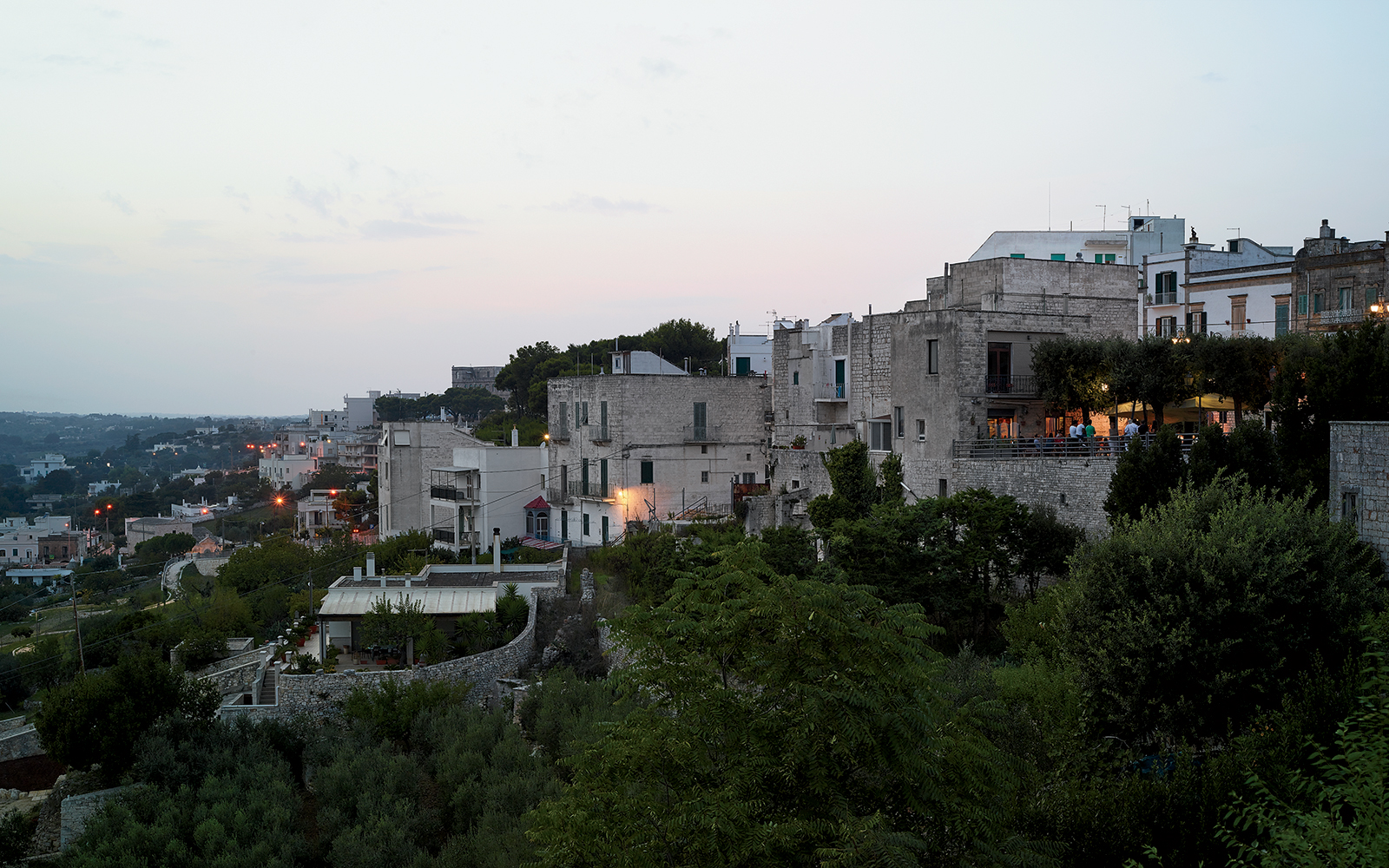 Massimo Vitali
Massimo Vitali
It was cocktail hour and Frankie, our daughter, was freshly bathed and in the new, too-expensive dress my wife had bought her. There were comb marks in her hair. Finn, my son, was in a little blazer. They had decided they wanted to wear their fancy clothes. The light was a light that made everyone and everything look good. Was this the time, I wondered? Were these the moments that we would look back on as our real life? Tan, relaxed, the trees seeming to glow from within. I took some pictures using my wife’s camera. I could show these pictures to my children later to prove to them that they’d had a good life. Maybe to them it all did cobble together into a life. Maybe it seemed to them we were living according to a plan. Maybe they weren’t aware that we hadn’t yet been able to make anything permanent in our lives, we didn’t own our apartment in Brooklyn, we didn’t know if we even wanted to live in Brooklyn, or America, and we were waiting to figure it out, but we were getting the feeling that time was running out on us. How was Frankie five already? And we had no regular summer place. Puglia had been a kind of experiment. We were desperate to find a house as soon as possible, and to keep going back there again and again as if, say, by going back to the same sun-bleached beach shack in Maine we could convince ourselves that nothing would ever change. Puglia—it could be right. It gives people that tantalizing feeling. People come here and suddenly find themselves shuttled around by real estate agents, caught up in fantasy. Buy now and you’ll have it for the rest of your life, wait and regret it. Francesco kneeled down and inquired about Frankie’s dress with grave seriousness. It had a mollifying effect on her; she liked Fran immediately. Finally she had someone who understood just how serious things are when you’re five. Frankie asked if we could do this again tomorrow and we said of course, what else would we want to do?